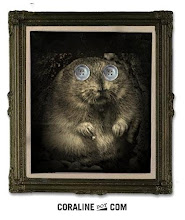Dear reader, a warning: This may seem grossly out of context even if you have read the novel on which I am writing. If you haven't, gods help you. It is brilliant, but challenging to comprehend on even my best day. I will post the question I am responding to, so it is not completely out of left field.
Thinking about the other works we've read so far, detective fiction seems to follow this pattern: a crime is committed, the detective (amateur or professional) investigates, the guilty party is discovered, punishment is (more or less) meted out to the guilty, the story is brought to closure or, at least, conclusion (with variations such as "The Purloined Letter").
How does Mumbo Jumbo adhere to and deviate from this pattern?
It goes without saying that every piece of detective fiction making an appearance this semester has a mystery to be solved. Mumbo Jumbo is no different in that aspect, but the type of mystery, the idea of morals and justice are a bit different. Rather than trying to track down a murderer of men, Mumbo Jumbo focuses on preventing the murder of Jes Grew. Ishmael Reed tells the reader that Jes Grew has fluctuated over time. Beginning in chapter 52, a narrative appears which indicates Jes Grew has been around in some form since the time of Moses. Even then, people like Set and the Atonists were on a mission to destroy it. The traditionalists couldn’t stand to see something bringing the “lower” people together that may allow them to find any power as a group. PaPa LaBas is the predominant figure in the novel trying to prevent the death of the Jes Grew movement by investigating the location of its sacred text and those trying to conceal it. Throughout the text, there are things that appear to be following the tradition of detective fiction, but then there is a departure from the traditional methods.
As is shown in detective fiction ranging from Edgar Allen Poe to Thomas Harris, there is a tendency for those with more power to discount or abuse the marginalized. Reed’s novel shows that more blatantly than any other we have read this semester. At every turn, we see Hinckle Von Vampton and the Wallflower Order trying to shut down Jew Grew. Every time there is the possibility of an “outbreak”, they scurry to shut it down. This “religion” is a threat to them because they are afraid of losing their social and political power. It is this fear that causes them to try to kill Jes Grew. If the Blacks, the Asians, the Latinos, the non-Christian traditionalists, etc have some exciting phenomenon to rally around, they may become a force to be reckoned with. The conspiracy the reader is left trying to solve is “who is trying to silence Jes Grew?” which points to another difference – the reader of Mumbo Jumbo is just as much (if not more so) the detective as any character Reed has written into the text.
Similarly to the other novels we have read, we have to follow clues, but the clues Reed gives leave us with more questions than answers. His twisted combination of fact and fiction ensures the reader can never trace actual events without running into a dead end or an aporia. It becomes a challenge to tell which side many of the characters are on by following the clues we are given. Often it seems as if in an ever to destroy “The Work”, one must do “The Work”. Moses seducing Isis in an effort to procure her sacred text is just one example of this, but even then, he tries to learn the secrets of the book rather than rid the world of it the way we believe he plans to (182-183).
One tradition of detective fiction that clearly holds up in Reed’s novel is the danger of being a detective or getting involved in a mystery. Due to their involvement in the Jes Grew mystery, Abdul is killed, Earline is possessed, and Charlotte vanishes. There is less deviation in this typical facet of detective fiction than the above, but there is still a key difference. The danger here is not always from tangible things or people. The novel’s supernatural aspects are just as much a threat to those tangled in the conspiracy and the investigation as any of the physical threats we have seen in other novels.
In the end, there is no single guilty party. There is no real crime. The catch is that much like in The Conjure Man Dies, Jes Grew is not really dead. Like Frimbo, Jes Grew will come back to life. It already has in the past, and it will again. After all, “time is a pendulum… what goes around comes around” (218).

No comments:
Post a Comment